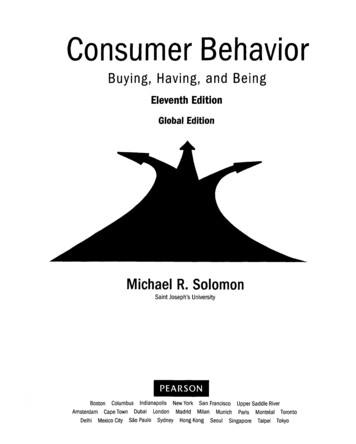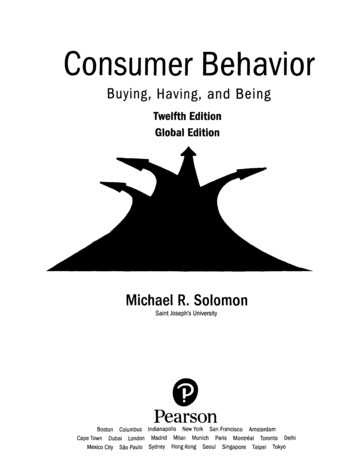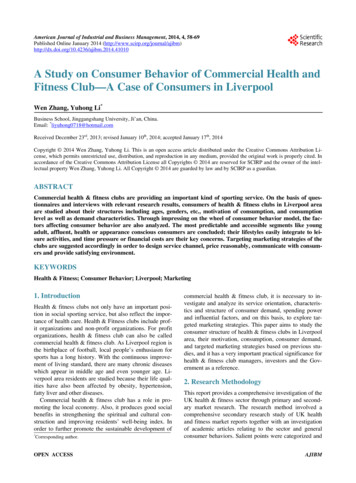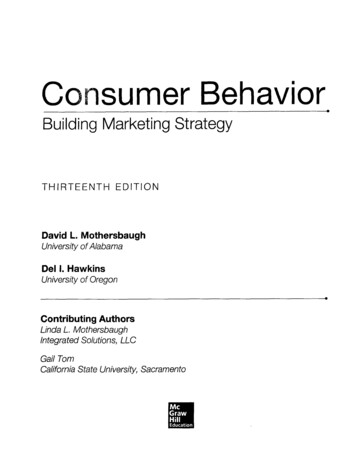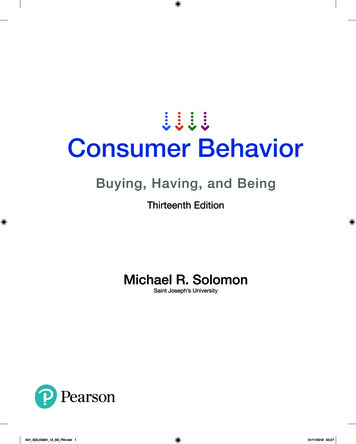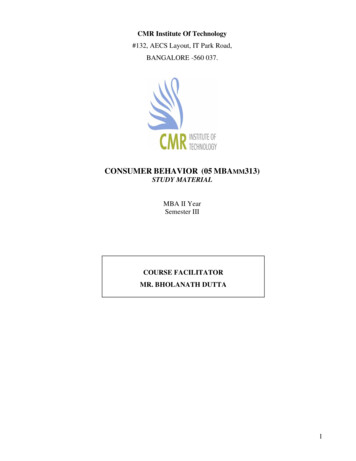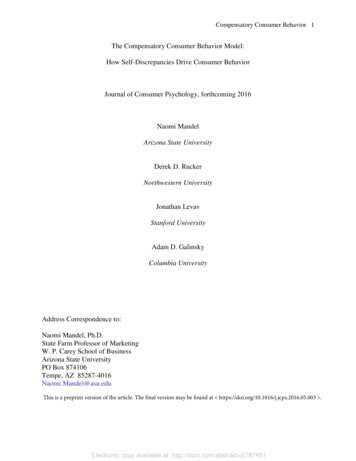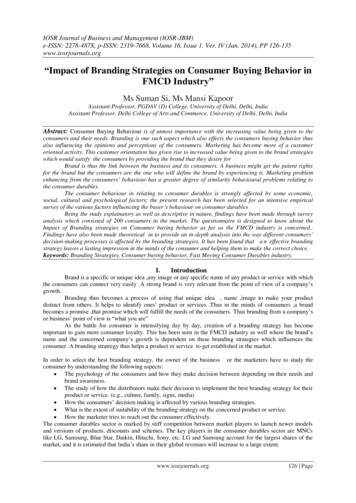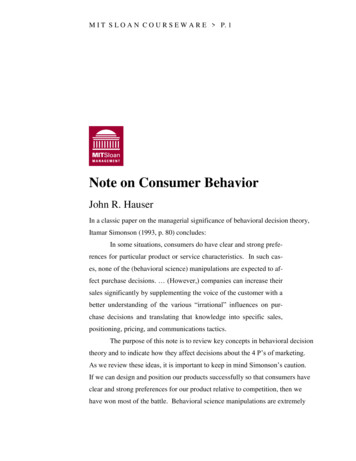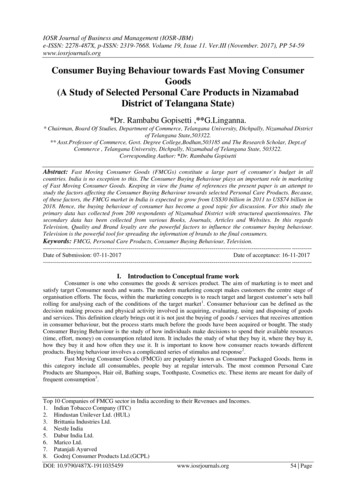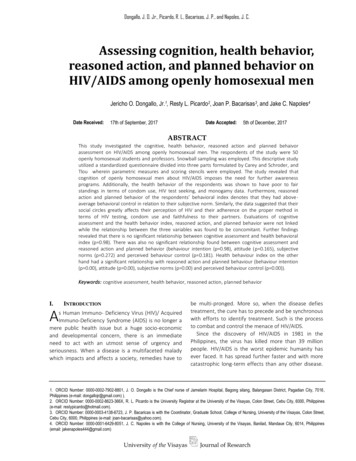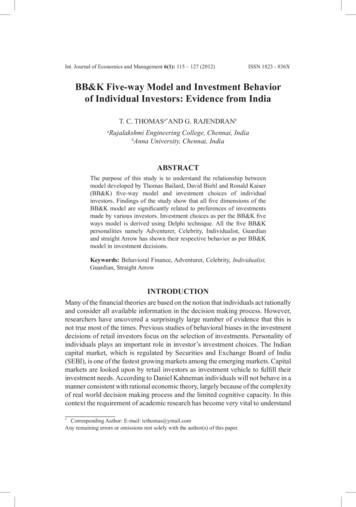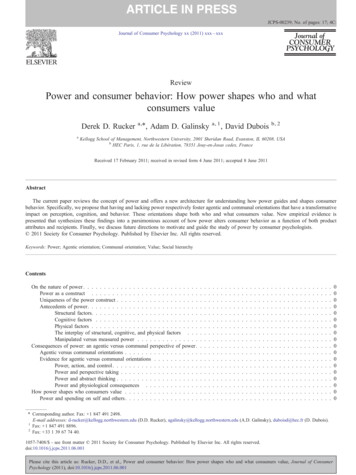
Transcription
JCPS-00239; No. of pages: 17; 4C:Journal of Consumer Psychology xx (2011) xxx – xxxJournal ofCONSUMERPSYCHOLOGYReviewPower and consumer behavior: How power shapes who and whatconsumers valueDerek D. Rucker a,⁎, Adam D. Galinskyaa, 1, David Duboisb, 2Kellogg School of Management, Northwestern University, 2001 Sheridan Road, Evanston, IL 60208, USAbHEC Paris, 1, rue de la Libération, 78351 Jouy-en-Josas cedex, FranceReceived 17 February 2011; received in revised form 4 June 2011; accepted 8 June 2011AbstractThe current paper reviews the concept of power and offers a new architecture for understanding how power guides and shapes consumerbehavior. Specifically, we propose that having and lacking power respectively foster agentic and communal orientations that have a transformativeimpact on perception, cognition, and behavior. These orientations shape both who and what consumers value. New empirical evidence ispresented that synthesizes these findings into a parsimonious account of how power alters consumer behavior as a function of both productattributes and recipients. Finally, we discuss future directions to motivate and guide the study of power by consumer psychologists. 2011 Society for Consumer Psychology. Published by Elsevier Inc. All rights reserved.Keywords: Power; Agentic orientation; Communal orientation; Value; Social hierarchyContentsOn the nature of power . . . . . . . . . . . . . . . . . . . . . . . . . . . .Power as a construct . . . . . . . . . . . . . . . . . . . . . . . . . .Uniqueness of the power construct . . . . . . . . . . . . . . . . . . . .Antecedents of power. . . . . . . . . . . . . . . . . . . . . . . . . . .Structural factors. . . . . . . . . . . . . . . . . . . . . . . . . .Cognitive factors . . . . . . . . . . . . . . . . . . . . . . . . .Physical factors . . . . . . . . . . . . . . . . . . . . . . . . . .The interplay of structural, cognitive, and physical factors . . .Manipulated versus measured power . . . . . . . . . . . . . . .Consequences of power: an agentic versus communal perspective of power .Agentic versus communal orientations . . . . . . . . . . . . . . . . . .Evidence for agentic versus communal orientations . . . . . . . . . . .Power, action, and control . . . . . . . . . . . . . . . . . . . . .Power and perspective taking . . . . . . . . . . . . . . . . . . .Power and abstract thinking . . . . . . . . . . . . . . . . . . . .Power and physiological consequences . . . . . . . . . . . . .How power shapes who consumers value . . . . . . . . . . . . . . . . . .Power and spending on self and others. . . . . . . . . . . . . . . . . .⁎ Corresponding author. Fax: 1 847 491 2498.E-mail addresses: d-rucker@kellogg.northwestern.edu (D.D. Rucker), agalinsky@kellogg.northwestern.edu (A.D. Galinsky), duboisd@hec.fr (D. Dubois).1Fax: 1 847 491 8896.2Fax: 33 1 39 67 74 40.1057-7408/ - see front matter 2011 Society for Consumer Psychology. Published by Elsevier Inc. All rights reserved.doi:10.1016/j.jcps.2011.06.001Please cite this article as: Rucker, D.D., et al., Power and consumer behavior: How power shapes who and what consumers value, Journal of ConsumerPsychology (2011), doi:10.1016/j.jcps.2011.06.001000000000000000000
2D.D. Rucker et al. / Journal of Consumer Psychology xx (2011) xxx–xxxPower and the value of one's possessions. . . . . . . . . . . . . . . . . . . . . . .Socioeconomic status and the value of oneself and others . . . . . . . . . . . . . .How power shapes what consumers value . . . . . . . . . . . . . . . . . . . . . . . .Powerlessness and the desire to acquire and display status . . . . . . . . . . . . . .Powerlessness and distortion of monetary value. . . . . . . . . . . . . . . . . . . .Status as a salve for powerlessness . . . . . . . . . . . . . . . . . . . . . . . . .Power and preference for performance . . . . . . . . . . . . . . . . . . . . . . . .Synthesizing how power affects who and what consumers value . . . . . . . . . . . . .Psychological propensities of power versus psychological needs of power . . . . . .Products lacking an association to status: dominance of psychological propensities .Products possessing an association to status: dominance of psychological needs . .Experiment: power and who versus what consumers value . . . . . . . . . . . . . .Power and consumer behavior: new opportunities and future directions . . . . . . . . .Power and agentic and communal orientations: new directions in consumer behaviorAgentic and communal orientations versus outcomes . . . . . . . . . . . . . . . . .New effects of power in new decision making contexts . . . . . . . . . . . . . . .Manifestations of power in the consumer domain . . . . . . . . . . . . . . . . . . .Psychological propensities associated with power versus psychological needs . . .Coda . . . . . . . . . . . . . . . . . . . . . . . . . . . . . . . . . . . . . . . . . . .Acknowledgments . . . . . . . . . . . . . . . . . . . . . . . . . . . . . . . . . . . . .References . . . . . . . . . . . . . . . . . . . . . . . . . . . . . . . . . . . . . . . . .Power has long been argued to be a pervasive andfundamental component of social systems and hierarchies.Russell (1938) went as far as to state, “The fundamental conceptin social science is Power, in the same sense that Energy is thefundamental concept in physics [ ] The laws of socialdynamics are laws which can only be stated in terms ofpower.” The governing effects of power on human behaviorhave been relentlessly examined in the psychology, organizational behavior, and sociology literatures (see Fiske, 1993;Magee & Galinsky, 2008). Across these literatures, thecumulative evidence suggests that power is an omnipresentforce whose tentacles reach out and grasp nearly every situationto guide and ultimately shape human behavior.Despite the long-recognized value and experimental study ofpower across the social sciences, the construct of power hasbeen largely absent from efforts to understand consumerbehavior. This is somewhat surprising given that differentdegrees of power exist and can arise in consumers' everydayactivities. For example, consumers are often partitioned in theworkplace into positions of high (e.g., bosses) and low (e.g.,employees) power. Similarly, society's social stratificationplaces consumers in various positions of power based on theireconomic resources or cultural capital (Bourdieu, 1984).Differences in power can also arise from asymmetric supplyand demand, resulting in sellers or consumers engaging in asales negotiation with differential levels of power. Furthermore,as will be demonstrated, even setting aside structural factors insociety that can affect power, differences in power might beactivated by architectural features of consumer markets such asadvertisements or assortment options. Our basic premise is thatall of these differences in power can spill over into howconsumers plan their purchase, make decisions, and acquireproducts and services.We first introduce the concept of power as a psychologicalstate. Next, we put forth a framework for understanding the.000000000000000000000influence of power on behavior. Specifically, we delineate howthe broad findings in the power literature can be parsimoniouslyaccounted for by recognizing that high-power states prompt anagentic orientation and low-power states prompt a communalorientation. We use this framework to succinctly explain therole of power in shaping who and what consumers value. Wethen empirically synthesize seemingly contradictory findingsinto a parsimonious account by presenting a new experiment.Here we introduce a critical distinction between psychologicalpropensities, inclinations or tendencies that are naturallytriggered by the psychological experience of power andpsychological needs, which represent power-induced motivations or desires that guide one's preference and often producecompensatory behavior. We suggest that power shapesconsumer preferences in a systematic fashion depending on adynamic interplay between both product type and productrecipient. The paper concludes by discussing new opportunitiesand directions for studying power in consumer behavior.On the nature of powerPower as a constructPower has traditionally been defined as asymmetric controlover valued resources in social relations (Keltner, Gruenfeld, &Anderson, 2003; Thibaut & Kelley, 1959; see Magee &Galinsky, 2008 for a detailed discussion). Magee and Galinsky(2008) used the words asymmetric and social relations tocapture the relative state of dependence between two parties: thelow-power party is dependent upon the high-power party toobtain rewards and avoid punishments (Emerson, 1962). As aresult, power is inherently a social construct that typicallyinvolves a comparison or interaction between two or moreparties. Magee and Galinsky (2008) also used the term valuedbecause the resource must be important or consequential to atPlease cite this article as: Rucker, D.D., et al., Power and consumer behavior: How power shapes who and what consumers value, Journal of ConsumerPsychology (2011), doi:10.1016/j.jcps.2011.06.001
D.D. Rucker et al. / Journal of Consumer Psychology xx (2011) xxx–xxxleast one of the parties. Of course, value is subjectivelydetermined: control over a resource only matters to the extentthat at least one party cares about and desires that resource.These resources may include actual monetary resources, abilityto reward or legitimate authority, or even intellectual capital,depending on the context and parties involved (see French &Raven, 1959). Importantly, resources are often subjectivelydetermined, in part resulting from individuals' perceptions ofthese resources and the situation. Thus, power refers to theperceived asymmetric control such that one individual has, orfeels as if he or she has, more or less control relative to another.Although this definition represents a broad, encompassingdefinition of power, others have differentiated power by thespecific bases by which this asymmetric control can arise. Intheir classic treatise on power, French and Raven (1959) suggestthat asymmetries in power can arise from five different basesunderpinning a relationship: a relation based on coercion,reward, legitimacy, reference, or expertise. Coercive powerrefers to the ability to get someone to do something against hisor her will. Reward power stems from the ability to give orwithhold desired objects from others. Expert power is thepossession of information that can be shared or withheld fromothers. Referent power is based on the ability to command therespect and affection of others, what most scholars today callstatus (Magee & Galinsky, 2008). Finally, legitimate powerrefers to the ability to administer to another certain feelings ofobligation or the notion of responsibility, but many scholarsnow see legitimacy as a moderating variable — one achievesreward or coercive power or exercises that power eitherlegitimately or not (Lammers, Galinsky, Gordijn, & Otten,2008). Although this classic perspective provides a means tosegment the power construct, the bases described can be viewedas subcomponents fueling the general possession of power aspreviously defined (i.e., asymmetric control over valuedresources in social relations).More recently, Lammers, Stoker, and Stapel (2009) havedistinguished between power over others (i.e., social power)and freedom from others (i.e., personal power). In a series ofexperiments, the authors argue and provide evidence for thenotion that these two types of power can, because of theiropposite associations with independence and interdependence,have unique effects on behavior. Both of these terms reflectdifferent facets of the power relationship, but are subsumed byour general definition as a power relationship can arise fromeither party having or lacking control. Consistent with thisperspective, Lammers et al. (2009) reported that both social andpersonal power correlated with a more general sense of power.In the present paper, we focus on power as asymmetriccontrol over valued resources in social relations because a) thisis both the broadest and most inclusive definition of power, andb) this is how the vast majority of research efforts have studiedthe construct. Furthermore, as we will discuss, the psychological experience of power does not have to stem from a particularbasis, nor does it have to be activated with respect to the socialor personal subcomponents. Rather, because of its pervasiveness, individuals can feel a general sense of more or less powerdue to simple cognitive priming or physical embodiment.3Uniqueness of the power constructPower can be distinguished from a number of otherpsychological states that have been studied within consumerbehavior and might be seen as overlapping or associated withpower. In particular, power is conceptually distinct fromconsumer mood (Labroo & Rucker, 2010; P
Power and consumer behavior: How power shapes who and what consumers value Derek D. Rucker a,⁎, Adam D. Galinsky a,1, David Dubois b,2 a Kellogg School of Management, Northwestern University, 2001 Sheridan Road, Evanston, IL 60208, USA b HEC Paris, 1, rue de la Libération, 78351 Jouy-en-Josas cedex, France Received 17 February 2011; received in revised form 4 June 2011; accepted 8
